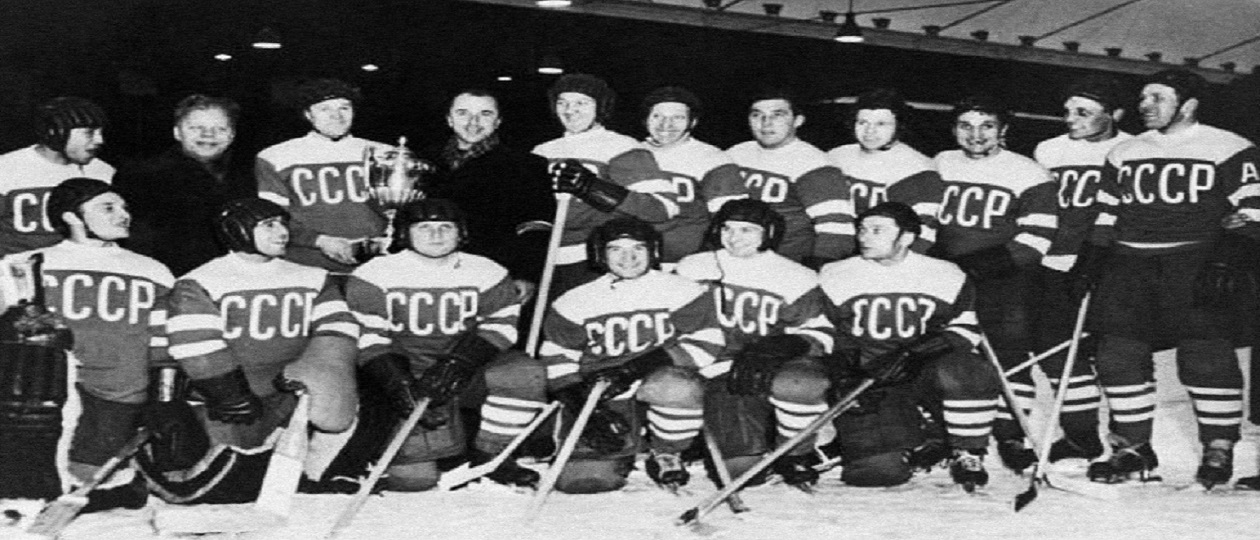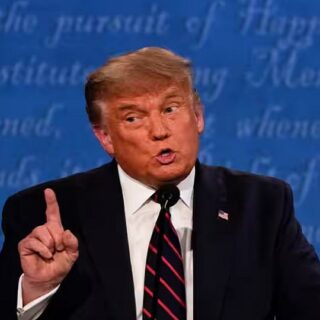
Since 2009, December 1 has been celebrated in Russia as the Hockey Day, commemorating the first national ice hockey championship, lauched in the USSR on December 1, 1946.
In our country the Hockey gained popularity so quickly that only 7 years later, on March 7, 1954, the Soviet national team on its very first try won the title of world champion, defeating Canada’s team in the decisive match in Stockholm.
Nobody expected this. On January 22, 1954, before Lyndhurst Motors left for Europe, The Globe and Mail published an article headlined: “Lyndhursts’ Coach Says His Team Will Win World’s Hockey Title.”
And on March 6, on the eve of the decisive game, one of the Swedish newspapers published a cartoon depicting a Soviet hockey player as a student who listened obediently to a Canadian in professor’s mantle.
On March 8, though, the Norwegian Morgenposten daily ran a report from Stockholm: “A packed stadium eyewitnessed a hockey newcomer treat Canadians like schoolchildren.” And in Canada, The Ottawa Journal admitted: “Russians Teach Canadians Lesson in Stickhandling”. In the birthplace of hockey, as Lyndhursts’ Reg Spragge put it, the defeat by the Soviet team was perceived “as if we had lost World War III.”
25 years later, in February 1979, I interviewed the coach and two players of the team that represented Canada at the 1954 World Championship in Stockholm. I need to confess that I called them with some trepidation. After all, I could open their wounds that had been bleeding for a quarter of a century. To avoid it, instead of stirring up the past I asked them to share what they were doing after that tournament.
Moe Galand, Lyndhursts’ best forward, was the first to respond: “I am a firefighter. Great profession for an athlete! It requires constant physical excercise. Just try to drag a fire hose weighing almost a hundred pounds!”
Coach Greg Currie: “I gave 25 years to hockey working as a scout and a manager at Toronto, Los Angeles, and Birmingham professional clubs. But recently I retired because of arthritis. I work in a sporting goods store now.”
“And I, — said former Lyndhurst Motors forward John Scott, – teach French, German and Spanish at Port Perry College. I still play hockey with my students and some other professors, but I do not participate in competitions, even for oldtimers. My youngest son chases the puck, and both elder twins also played hockey before going to university.”
“And my only 25 years old son is so keen on hockey that he spends all of his time at the rink from early morning till late at night,” Galand said. “As for myself, I try to stay in shape. Just like a quarter of a century ago, I play on the same line with Bob Kennedy and Norm Gray. We are still quite good to often beat much younger players. And if I had a chance [here he chuckled — A. P.] to play with Guy Lafleur and your Boris Mikhailov I could have shown myself at NHL!”
Galand continued, “If I had my way, I would teach our boys to do what your best players are doing so well: how to handle the puck. I can’t tell you how disgusted I feel by constant brawls on ice! In Stockholm, I learned from my own experience the strength and power of Soviet hockey players. Your defencemen did not knock me down and still they didn’t let me do my moves. I was lucky to score at least once…
I also asked my interlocutors to name the best Soviet hockey players. John Scott was the first to respond, “I like Tretyak, Kharlamov, the Golikov brothers, Yakushev, Vasiliev, Ragulin.”
Greg Currie continued: “After the Stockholm championship, I did not miss any of your teams visiting Canada. To me, Firsov is the best Soviet hockey player. Also, I remember Sologubov very well (what a superb defenceman!), Alexandrov, Starshinov, Ragulin. I will stop here, though. Otherwise I would have to name them all without exception. Still, I will specify Mikhailov… And I can’t tell what your hockey players need to do to improve.”
“Another advantage of Soviet hockey is the team play, — noted Galand. — And your resourcefulness and ingenuity!.. During our game in Stockholm, the ice turned to mush because of the rain. As a result we couldn’t get to your goal for the entire first period while your guys quickly adapted. They started passing — and even dribbling — the puck with their skates.”
In conclusion, I asked my interlocutors to say what they wanted to convey to their former opponents.
“I sincerely admire what they did for the Soviet hockey,” said Scott.
As for Galand, he had more than just one reason to feel disappointed by the Stockholm tournament. Besides his team’s loss, he did not get the special award for the best player in spite of the fact that he had outscored everyone else. Which makes his words even more remarkable: “Needless to say, I was upset when they preferred Bobrov to me. But he played brilliantly… Your hockey players are true gentlemen. After that championship, I met them several times in Canada. And I was always amazed by their good manners and respectful attitude towards their opponents…. Please tell those who took part in the Stockholm tournament: I have never met better players anywhere else. They are true champions!”





